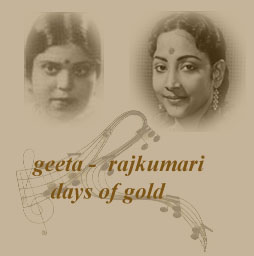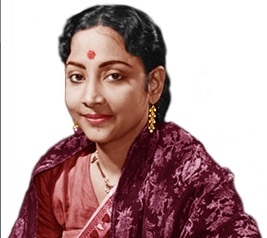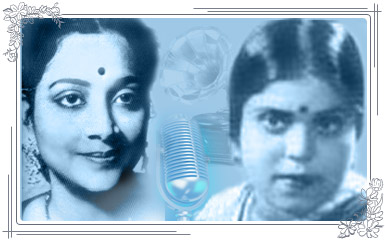|
Imagine a duet combination which is joy, warmth,
lilt, sentiment, sensuality and a thousand other flavours all rolled
into one. A combination that like a warm butter cube melting into a
sumptuous pav bhaji yields spark, tanginess, heat and a nice dose of
masala. A combination that rivals the sweetness that comes when thick
condensed milk, velvetty cocoa, a thousand nuts and the loveliest thick
sugary syrup one can get combine in a factory to produce the most
delectable chocolate there can be. Two voices that are same-same
but different. Why just their voices, there lives too
sometimes echo the same sentiment. And, why not? Both are the original
voices. Two voices whose nectar was probably collected by the bees of
God's garden. Sometimes, I wonder were they mere mortals? I have a
sneaky feeling both were probably two of the most beautiful Apsaras
in Heaven, sent back for committing a small mistake, perhaps. How
else can one explain this heady combo of talent, beauty, grace, charm
and unfortunately a life of tragedy to go with it. A thousand voices
pop inside my mind and reiterate, yes it must be so.
These two Apsaras I talk about are like I said above same-same but
different. Both have this unique original voice. Both have this warmth
in their voice. Both can produce an emotion seeped voice in a minute
and in the other give a naughty wink in their voice which amazes you.
Both were groomed definitely as
Apsaras by God up there. How else can one explain why they could
produce magic in a minute which others can't get inspite of years of
training? Yes, yes, they were sent on earth by God after rigorous
training only. Not just in music, but in being great human beings too.
Both are the epitomes of modesty and humility. (And both probably paid
the price for it too). Both came in at a young age to fame on sheer
talent alone and rose to
the echelons of greatness. Unfortunately, due to the tragic hand of
fate both got the "royal ignore" from the very people whom they had
helped establish. Why was that so, one may wonder. Was it because the
duo knew only how to sing from the heart and didn't indulge in
treachery, back-stabbing and games of vice? With time their names went
into their background but their memories have never left the hearts of
those who not only listened to them but drowned their senses in their
music.
I am of course talking about the honey-voiced duo, Rajkumari Dubey and
Geeta ji. Rajkumari ji was the senior of the duo but there are many
parallels between their careers. She started her career as a stage
artiste. She recounted in an interview, "Vijay and Shankar Bhatt of
Prakash Pictures spotted me during one of my shows. They liked my voice
and persuaded me to discontinue acting on stage, as it would spoil my
voice. (In those days, there were no mikes and you had to shout to be
heard!) So, I quit theatre and became an employee of Prakash Pictures,
as an actress and singer". With such simplicity She thus, described the
starting of her filmy sojourn. Her actual debut was in the Gujarati
movie, Sansaar Leela in 1934 at the tender age of ten. This was the
third gujarati talkie (the first two being Narsinh Mehta and Sati
Savitri which were released in 1932). She is known to have sung atleast
two solos and
two duets with Umakant Desai. Her hindi debut came with the Hindi
version of this movie, Nai Duniya(1934). The music director for both
these movies, was
the stalwart, Lallubhai Nayak who was to groom her talent in this
decade both for Hindi and Gujarati movies. She acted in many important
movies of the period including Ramayan(1934) where she played the role
of Sita, Vatan Parast alias Parveez(1934), Bambai Ki Sethani(1935),
Bombay Mail(1935), Achhut(1940), Anjaam(1940), Matwaali Jogan alias A
Girl From Lahore(1936), Village Girl(1936), Millionaire(1936), Nazar Ka
Shikaar(1936), Pujaarin(1936), Snehlata(1936) among others and of
course, the most iconic of them all, the classic Devdas(1935) where she
played the role of Chandramukhi which has been reprised by many later.
But, She was the first one there, acting as Sita one day and
Chandramukhi on another, at will. She took up a wide variety of roles
and captured many hearts including that of Mr Dubey, a businessman of UP whom she got
married to. Sometime after her marriage, probably around 1941, She
decided to stop acting and switched full time to playback singing since
singing was her passion. She had sung for many greats like Nayak, Rao,
R.C. Boral and Timir Baran during her acting years and this training
cemented her place as one of the most wanted singers for over a decade.
Infact, one can say that she was probably the first full time and most
popular female playback singer.
A few years later, her paths crossed with an upcoming singer, Geeta
Roy. They first recorded a song for composer Premnath for the movie
Dehati alias Villager in 1947. This is the rarest of the rare, among
their duets (Its not even mentioned in the Geet Kosh). The song is
Kaise Likhogi Gori Patiyaan Balam
Pardesa Tihaare. It is a song, in which one Sakhi is teasing another
about her beloved being away. Rajkumari ji sings for the sakhi teasing
and Geeta ji for the one being teased. Rajkumari teases Geeta ji with
the starting line to which Geeta ji replies Phoolon pe likh ke
bhejoongi patiyaan. Rammurthy Chaturvedi has infused lots of emotion in
the song and has touched some issues of the time as well. While in
beginning with above start they are merely teasing, later one comes to
know why the cheering is being done, when one hears Rajkumari singing,
Kaahe Nanadiya roz maare balam pardesa tihaare towards the end where
Geeta ji sings, Padhi Likhi Hoti to Likh Likh Patiyaan, Baalam Ko
Dukhda Sunaati, while a concerned Rajkumari sings consolingly to say,
Bachchon Ko Achhe Sikhaoge Sapne Gandhi Jawahar Banaati, Nahin Jeeti
Kisi Ke Sahaare. What a range of emotions and situations the song
brings up. This is the best start their singing partnership could have
got, with the singing talents of both singers being showcased
wonderfully.
While the duo were recording this song, the other two pillars of their
partnership were getting ready somewhere in the studios of bombay. Now
surprised,
you may ask for a duet combo from where do two more pillars come from?!
But perhaps you won't be so surprised. You're well versed listeners
after all. The
two other pillars of any singing partnership are the lyricist and the
composer. This lyricist-composer duo was to give us as many as eight
rajkumari-geeta gems among themselves. The composer was under contract
with some studio for music related work and was picked up by the
greatest lyricist-director ever. But there was a hitch. The composer
was under contract for some time and couldn't give music outside. They
finally agreed to change composer's name in the credit and decided that
it would be the name of the composer's own daughter. That is how the
legendary Kidar Sharma ensured the debut of B.Vasudev after
taking his daughter Snehal's name to become Snehal Bhatker.
The stage was set for an extravaganza called Neelkamal(1947). This
movie is also known for the debuts of the evergreen Madhubala and Raj
Kapoor. This
movie provided a treat of as many as five songs featuring rajkumari and
geeta roy together. Geeta provides good support to the veteran in all
the songs.
The first one was Maa ne Bheja Dhor Charaane, a naughty song in which a
cowgirl sent to graze the cows recounts meeting her lover on the sly
while being teased by her friends. The way rajkumari and sakhis sing
'tu kuchh samjhi na bhai main kuchh na samjhi' is full of pure
innocence. Kidar Sharma recounts
the episodes very vividly the goings on of the 'jungle romance'where
the cowgirl goes searching her lover and gets a 'peetal ka kangan' from
him! The song
mostly belongs to rajkumari like some of the others in the movie but
geeta roy wonderfully complements with the chorus giving the song a
lovely charm.
The next song ab kya teri marzi re, bol bol balam bedardi is the
highlight of the movie. Both singers enthuse a lovely old world charm
to the song.
The song has the singers asking the beloved what he wants while
describing the longing for him and efforts done to attract him. The
song appears to be picturised (perhaps as a means to distract soldiers)
while an enemy is attacking (as appears from the dialogues
interspersing the song). This is a must hear for lovers of the two
singers.
Mukesh joins the duo for the next song, aankh jo dekhe hai dhokha
khaaye hai. He begins the song with the title lines and is then joined
by the duo. The
music is kept minimal and the singers carry the song on their
shoulders. The song is fairly melodious and geeta gets quite a few
lines to herself in the
latter part of the song. A nice song but which is overshadowed by the
others in the film.
he other duet, jawani agar hook dil ki dabaye, the duo's voices gel
like hot honey gelling with the choicest chocolate icecream. This
thoughtful song
is a mini-commentary on the feelings of the protagonist and appears to
be a situational one. Its saving grace is the singing duo partially.
In the fifth song the duo is joined by the debutant composer bhatker
himself. The song is Brij mein dhoom macha ja oh mathura ke raja murali
baja ja aa ja.
The trio is dedicated to krishna and is delivered effortlessly by the
singers. Its a great song to round off the songs sung by the duo. This
is a song one
would like to listen in those slow mornings and get charmed by the duo.
The duo next got a chance to sing for composer hari bhai for the song
aap beeti. However, the song audio is not available.

We next have kidar sharma and bhatker bringing the duo back for three
duets for the film suhag raat which incidentally launched the ethereal
Geeta Bali. The
two geetas were to become a force to reckon in a few years but in next
couple of years, rajkumari ji was her default voice. Rajkumari ji used
to sing
specially keeping her vivaciousness in mind. All three duets are a
treat for the lovers of these two artists.
The first duet is the lovely, Roomjhoom matwaale chaa gaye. The duo
brings vivid imagery to their singers. When the duo sing 'roomjhoom
matwaale badal chaa gaye' one gets the feeling that indeed spring has
come and when they say 'balamji tohri yaad dila gaye', one indeed feels
the longing for the lover. The trend continues throughout the song and
is to be heard to be believed. Both singers get ample opportunity to
show their talent and do full justice to the
song justifying their choice by the composer.
The second song (which incidentally was on the other side of the record
for first song), Baaje Mori Paayal Thunnak Thunnak Thun also follows a
similar trend. When the duo sing the first line itself, Baaje mori
paayal thunnak thunnak thun mohe yeh sandeswa sunaaye re and later,
dekho kaliyon ne ghoonghat
hataaye re, logon bhanware bides se aaye re. One can actually imagine
all this happening in the back of one's mind. Ditto, when rajkumari
laments, "Maine Surme se Naina Sajaaye Re Donon Haathon se Dil Hoon
Dabaaye re", the voice hits you like a thunderclap instantly making the
listener to feel sorry for the damsel in love. The song undoubtebly
showcases the class the two singers had.
The third and final song is the final gem sung by the duo for the
bhatker-kidar team. It is the fabulous, Kis paapi sang uljhi ankhiyaan
haaye ankhiyaan ro ro nayan ganwaayen, kya bigde humse man basiya sapne
bhi nahi aaye re. Right from the first line, the duo grab your
attention, your feeling of empathy
for the separated lovers and keep you mesmerised long after the song is
over. The song makes one feel extremely peaceful and must be
recommended playing
for those looking for peace in the bhrahm muhoorat. A perfect song in
almost all departments.
It is indeed a pity that we didn't have Snehal Bhatker bringing the duo
again. Indeed, his career didn't take off in a big way in the later
years. He was
of course to use Geeta again for his swansong Chhabili many years later
in 1960. One only wishes he had brought Rajkumari back from forced
oblivion and had
the duo charming us again. Who knows, it might have ushered in another
golden period for the duo?
Both are arguably one of the best female duet partners who
unfortunately got half a song again (for Maang), Aaya Achanak Aesa
Jhonka, which is also not available (The other part being a geeta duet with hamida bano). Thinking of the possibilities
which could have come from this duet combo, One is reminded of what was
said in that great geeta gem, Waqt Ne Kiya Kya Haseen Sitam, Tum Rahe
Na Tum, Hum Rahe Na hum. A sad tragedy of time but then, we must be
greatful for the short fresh breeze which their few songs
did provide us. May the memory of the duo and their songs stroke the
imagination of generations to come.
|





